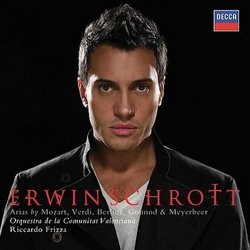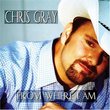| All Artists: Riccardo Frizza, Orquestra de la Comunitat Valenciana, Erwinn Schrott Title: Arias By Mozart, Verdi, Berlioz, Gounod & Meyerbeer Members Wishing: 0 Total Copies: 0 Label: Decca Original Release Date: 1/1/2008 Re-Release Date: 9/23/2008 Genre: Classical Styles: Opera & Classical Vocal, Historical Periods, Classical (c.1770-1830), Romantic (c.1820-1910) Number of Discs: 1 SwapaCD Credits: 1 UPC: 028947804734 |
Search - Riccardo Frizza, Orquestra de la Comunitat Valenciana, Erwinn Schrott :: Arias By Mozart, Verdi, Berlioz, Gounod & Meyerbeer
 | Riccardo Frizza, Orquestra de la Comunitat Valenciana, Erwinn Schrott Arias By Mozart, Verdi, Berlioz, Gounod & Meyerbeer Genre: Classical
Hailed as the "Brando of opera," Uruguayan bass-baritone Erwin Schrott joins Decca with a deliciously charismatic and seductive debut album. Showcasing some of opera's most famous roles, Schrott demonstrates why audiences ... more » |
Larger Image |
CD DetailsSynopsis
Album Description Hailed as the "Brando of opera," Uruguayan bass-baritone Erwin Schrott joins Decca with a deliciously charismatic and seductive debut album. Showcasing some of opera's most famous roles, Schrott demonstrates why audiences and critics around the world continue to cheer at every performance. Acclaimed for his portrayals in the operas of Mozart, Schrott is the first choice at the world's greatest opera houses including the Metropolitan Opera (where he will portray Don Giovanni this fall and winter), La Scala, the Royal Opera House, LA Opera, Washington National Opera and many others. Schrott's debut album perfectly showcases his distinctive, chocolaty voice and his wonderful talents for characterization. Among the included arias are his favorite Mozart roles as well as repertoire from great 19th-century opera composers such as Verdi, Meyerbeer, Berlioz, and Gounod. Schrott has emerged as a leading opera star on the world's greatest stages and will continue to thrill many with his resonant and multi-hued voice. Similar CDs
|
CD ReviewsSafe, Staid, Perfunctory Performances David Cady | Jersey City, NJ USA | 09/26/2008 (3 out of 5 stars) "In a recent New York Times interview, Erwin Schrott is quoted as saying that "he was worried...that the sound of his voice -- 'my ideal sound, my inner sound, what my ear hears' was not coming through on [his debut] recording." The article goes on to disagree, stating that "the engineers have ably captured the heft, warmth and chocolate-tinged colorings of [Schrott's] voice." Personally, I agree a bit with both opinions. In this, his first recital CD, Schrott comes across as an able musician with a decent, often powerful, instrument, but not always an exciting one. Compare this disc to Simon Keenlyside's recent "Tales of Opera," on which he sings a collection of familiar arias with such superb vocal artistry and characterization that it's as if we're hearing them for the first time. No such magic happens during Schrott's ordinary, characterless portrayals; mostly what's lacking is a unique point of view that would separate him from other singers. (In fact, half-way through my first listening, I was so uninvolved I switched my iPod over to David Daniels's new Bach CD, which I had purchased on the same day.) Apparently, Schrott's stage persona is dynamic and almost dangerously spontaneous (I've never seen him, either live or on DVD); if only that shone through on this recording." The stage image is sexy, but Schrott's vocal acting is serio Santa Fe Listener | Santa Fe, NM USA | 09/23/2008 (3 out of 5 stars) "Decca is unbashedly leaping into the arena with "barihunk" Erwin Schrott, one of the hottest items on the list of male opera stars who take their shirts off and flirt seductively with their roles. Baritons -- or in this case a deeper bass-baritone - have enough handicaps competing with tenors for center stage, so why not? Schrott's calling card is Don Giovanni, a role where seductiveness is highly desirable, and here he takes on Leporello's catalog aria as well. One notices right away that this is a very good if somewhat generic voice -- solidly placed, dark, and flexible. Schrott really acts the catalog aria, adding a knowing laugh at one point. To prove that he's not just a charmer, the second aria is King Philip's anguished Act 3 monologue from Verid's 'Don Carlo.' Schrott's basso isn't as rich and deep as Ghiaurov, Christoff, or Ramey, to name some notable Philips, but he's dramatically convincing, and the added flexibility of a "basso cantante," as Decca describes him, keeps this somber music from becoming turgid and lachrymose -- in fact, Schrott sings with a moving, restrained dignity. It's odd to hop back to Don Giovanni, where we hear "Deh vieni alla finestra" sung as suavely as Siepi ever did but with not nearly as much personality and urgency. The Don's Champagne Aria is taken slowly and feels bland rather than fizzy and exuberant. More Verdi and Mozart follow -- this seems to be the territory Schrott has marked out for himself, but I'm bothered that Figaro's "Seh vuol ballare" sounds so humorless and phlegmatic; this offended groom-to-be doesn't seem upset at all that anaother man wants his bride. Schrott's sexy image, in fact, is tied to a decidedly conservative style of singing, with only occasional flashes of life. "Non piu andrai" should be a slam dunk for any Figaro, but here it sounds like old Don Basilio teaching a vocal lesson. Still, Schrott obviously has a quality voice, and I imagine that on stage his charisma does a lot to fill out the weak spots in his vocal acting. Here's the track listing: Berlioz: Voice des roses (Air de Méphistophélès) Gounod: Serenade: Vous qui faite l'endormie (Mephistopheles) [from Faust] Meyerbeer: Voici donc les debris... Nonnes qui reposez (from Robert le Diable) Mozart: Madamina, il catalogo è questo (from Don Giovanni) Deh! vieni alla finestra (from Don Giovanni) Fin ch'han dal vino (from Don Giovanni) Bravo, signor padrone...Se vuol ballare (from Le nozze di Figaro, K.492 / Act 1) Le nozze di Figaro: Aprite un po'quegli occhi Non più andrai (The Marriage of Figaro) Verdi: Elle ne m'aime pas! (from Don Carlo / Act 3) Gran Scena: "Studia il passo, o mio figlio!" (from Macbeth / Act 2) O toi Palerme (from Les Vespres siciliennes) " Excellent recital Rosomax | Boulder, CO United States | 01/09/2009 (4 out of 5 stars) "Looking at most of the other reviews, it seems that Mr. Schrott has inadvertently offended some listeners by his good looks. Even though this is slightly amusing, I would like to put forth a suggestion that while of great value onstage or on video, dashing good looks are neither help nor hindrance for an artist when we're just listening to him sing. I remember the first time I listened to Ewa Podles's CD from Naxos which had no cover pictures whatsoever. I was still awed by her and still am. It's all about voice.
Speaking of which, Erwin Shrott possesses a likable youthful-sounding basso voice, very different from, say, Christoff or Ghiaurov (my all-time favorites) but interesting, rich, and exciting in its own right. There are some minor enunciation issues, but so minor indeed that they can safely be ignored. All non-native speakers are prone to an occasional slip when trying to sing and emote in a language they haven't grown up with. It is indeed very difficult, as I have experienced first-hand. Schrott, in my opinion, does a fantastic job with Mozart. For some unknown reason Decca producers chose to space the "Le Nozze" arias apart, but I very much enjoyed Scrott's portrayal of Figaro, particularly "Se vuol ballare" which is given a somewhat sarcastic treatment, coupled with youthful confidence -- this Figaro isn't at the slightest intimidated by his rival. I liked that. Verdian repertoire is surprisingly vast and well-handled for a basso whose specialty is clearly Mozart. I personally prefer Italian version of Philip's great lament, but Schrott's deeply felt, even intimate, rendition still works, especially in contrast to many shouting versions I heard lately. Banquo's aria from "Macbeth" is superb, Schrott manages to sound older and terrified, yet restrained, the ending high note is beautifully executed. Finally, his devil roles are not scary (think Ghiaurov, Ramey) but rather energetic and playful. I would like to conclude by saying that I didn't find his characterizations "flat" or "plain". They're not mesmerizing (yet) perhaps because this is his first recital CD. However, there's a "Le Nozze di Figaro" DVD out and one can immediately see a huge potential this singer has. I, for one, look forward to following his career and will definitely buy his future albums." |

 Track Listings (12) - Disc #1
Track Listings (12) - Disc #1
